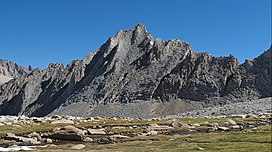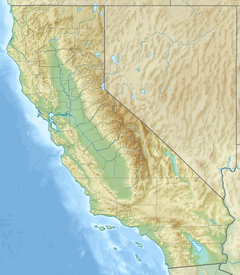Mount Carl Heller
| Mount Carl Heller | |
|---|---|
| Vacation Peak | |
 West aspect | |
| Highest point | |
| Elevation | 13,211 ft (4,027 m)[1][2] |
| Prominence | 495 ft (151 m)[3] |
| Parent peak | Tunnabora Peak (13,563 ft)[4] |
| Isolation | 1.00 mi (1.61 km)[4] |
| Coordinates | 36°36′42″N 118°17′55″W / 36.611594°N 118.298654°W[3] |
| Naming | |
| Etymology | Dr. Carl Heller |
| Geography | |
| Location | Sequoia National Park Tulare County / Inyo County California, U.S. |
| Parent range | Sierra Nevada |
| Topo map | USGS Mount Whitney |
| Geology | |
| Rock age | Cretaceous |
| Mountain type | Fault block |
| Rock type | granitic |
| Climbing | |
| First ascent | 1966 |
| Easiest route | class 3 scrambling[4] |
Mount Carl Heller is a 13,211-foot-elevation (4,031 meter) mountain summit located on the crest of the Sierra Nevada mountain range in California.[1] It is situated on the common border shared by Tulare County with Inyo County, as well as the shared boundary of Sequoia National Park and John Muir Wilderness. It is set 13.5 miles (21.7 km) west of the community of Lone Pine, 1.9 miles (3.1 km) north of Mount Whitney, and 0.6 miles (0.97 km) northwest of Tunnabora Peak, the nearest higher neighbor. Mount Carl Heller ranks as the 105th-highest summit in California.[4] Topographic relief is significant as the west aspect rises approximately 1,755 feet (535 meters) above Wallace Lake in 0.38 miles (0.61 km).
History
[edit]The first ascent of the summit was made in August 1966 by Carl Heller and Al Green via the East Arête.[2]
This landform is unofficially named after Dr. Carl Anthony Heller (1922–1984), founder of the China Lake Mountain Rescue Group in 1958.[5] His group's search and rescue operations in the Mount Whitney area saved many. He was a research chemist and mountaineer who made the first ascent of this peak. This feature has also been called "Vacation Peak",[1] in association with its position immediately above Vacation Pass.

Climate
[edit]According to the Köppen climate classification system, Mount Carl Heller is located in an alpine climate zone.[6] Most weather fronts originate in the Pacific Ocean, and travel east toward the Sierra Nevada mountains. As fronts approach, they are forced upward by the peaks (orographic lift), causing them to drop their moisture in the form of rain or snowfall onto the range. Precipitation runoff from this mountain drains west to the Kern River via Wallace Creek, and east to Owens Valley via George Creek.
See also
[edit]References
[edit]- ^ a b c R. J. Secor, The High Sierra Peaks, Passes, Trails, 2009, Third Edition, Mountaineers Books, ISBN 9781594857386, page 83.
- ^ a b John Moynier, Claude Fiddler (1993), Sierra Classics: 100 Best Climbs in the High Sierra, Chockstone Press, ISBN 9780934641609, p. 50
- ^ a b "Mount Carl Heller, California". Peakbagger.com. Retrieved 2022-06-12.
- ^ a b c d "Carl Heller, Mount - 13,225' CA". listsofjohn.com. Retrieved 2022-06-12.
- ^ Elizabeth Wenk (2016), One Best Hike, Wilderness Press, ISBN 9780899978321, p. 138
- ^ "Climate of the Sierra Nevada". Encyclopædia Britannica.
External links
[edit]- Carl Heller biography: China Lake Mountain Rescue Group.org
- Mt. Carl Heller climbing: Mountainproject.com


